 Don't invite vampires into your home. It's a maxim that is surprisingly relevant to importers and exporters. Vampires may be just observing otherworldly etiquette or may be afraid of some sort of sanction (although it's hard to imagine what would scare the undead, other than being forced to watch Jersey Shore reruns). Unless you invite a vampire into your house, for whatever the reasons, the vampire cannot enter to do whatever vampires do. What do vampires do? Not to paint with too wide a brush, but vampires tend to run in monster mode most of the time. Scuttlebutt has it that there are movies and books targeted at wide-eyed teenage girls that portray vampires in a sympathetic light, but it's doubtful that parents anywhere would allow their daughters to date a vampire, especially not one who sparkles. And what do federal enforcement authorities do? Well, they enforce. They are always in enforcement mode. To invite them in to your place of business may open you up to all sorts of liability. It is generally not the smart thing to do. Now don't misunderstand. This is not to suggest that anyone should obstruct or impede federal authorities from doing their job. You should never do that. However, you may want to avoid doing their job for them. Beware enforcement officials bearing gifts. The government talks trade facilitation, but acts enforcement. If a cop were to drop by your home and asked you to come in. You'd ask why, and the cop would say, "we're doing community outreach and we just want to tell you what is legal or not legal. While we're here, you wouldn't mind if we looked through your computer, would you?" You laugh, but US Customs and Border Protection (CBP) uses a similar approach in Significant Importer Reviews, a cryptic program of suspect provenance and design. CBP claims that Significant Importer Reviews are informal, friendly outreach visits that allow importers of a certain size and volume and CBP to know each other without risk to either. The problem is that these outreach efforts can easily devolve into fishing expeditions. The other problem is that there are no formal guidelines or regulations regarding this program to restrain CBP from overreaching. Indeed, CBP has not reduced any of the program goals or guidelines to writing, a red flag to importers if there ever was one. Outreach efforts from enforcement authorities can harm exporters as well as importers, of course. Take, for example, Powerline Components Industries, a company that is currently featured by the U.S. Bureau of Industry and Security on its website (which is not a good thing). Powerline shipped diesel engines to Syria without the requisite license. The question for export enforcement authorities was whether the violation was intentional because if it was, then the penalty could be stiffer. Just about the time it was about to ship, enforcement officers paid a friendly outreach visit to the exporter during which the officers described the nightmares that befall violators of US sanctions laws. With that warning, Powerline knew or should have known that the export was illegal, i.e., it had the requisite intent. Enforcement authorities had little trouble forcing the company to pay a hefty penalty. A vampire could not have done better.
1 Comment
 Lawyers (those worth their price) relish when they get to remind enforcement officials that they are as obligated to follow the law as they are to enforce it. The government is constrained by due process considerations from manufacturing laws out of thin air. We are watchdogs against tyranny. Take, for example, appealing a failing grade on the customs broker exam. You might wonder how government overreaching can infect this seemingly esoteric area of the law, but a law is no longer esoteric when it affects you personally. Imagine if you invest considerable time and money to studying the customs broker exam, but you come up short, missing passing by a couple of points. Voilà! There is an appeals process afforded you in Title 19 of the Code of Federal Regulations. In fact, appeals are set out neatly in 19 CFR Sections 111.13 and 111.17. It’s all there. Just follow the regulations as officially set out by the agency, and you’ll get a fair and square review of your appeal. If only it were that simple. US Customs and Border Protection’s website has additional, and some (like me) would say different and arbitrary requirements. Suddenly appellants face an additional layer of bureaucracy not found in the regulations. CBP did not publish these new requirements in the Federal Register to allow the public to comment. Here is the most alarming part. CBP automatically rejects an appeal for any of the following: An incomplete application.
How shall I begin? CBP reserves to itself the power to automatically reject your appeal for an infraction of any of the arbitrary requirements. Automatically? CBP fabricates arbitrary, vague rules, and people don’t even get to first base if they don’t follow those rules? CBP will automatically reject your appeal if it’s incomplete, which begs the question, what does a complete appeal look like? By “incomplete erasures or insufficient markings”, I assume that CBP is referring to the ovals on the standardized answer paper sheet that test-takers must fill in with a No. 2 pencil. Ghosts of the hanging chads! CBP can’t be really asserting that people can’t confirm that CBP accurately recorded their test results. Here is the real kicker: “if the application includes any arguments written by another person.” This requirement is an audacious arrogation. CBP is saying that the person filing the appeal must not have anyone assist in preparing the appeal. The appeal has to be in your own words. There is nothing in the regulations or under statute that forbids a person from having someone help you with your appeal. There could not be. The customs broker exam is over. The person appealing is not obligated to prove additional mastery of customs brokerage, and especially not by drafting clever expositions to try to impress CBP. The customs broker exam is standardized to remove all subjectivity from the process. If one person gets credit for his or her answer, all other test-takers who answered the same automatically deserve equal consideration regardless of who wrote the appeal, and regardless of whether everyone uses identical arguments to appeal. I venture to guess that CBP conjured up this requirement to discourage people from collaborating on their appeals. A group of smart people might punch holes in CBP’s carefully-crafted exam. CBP may even want to discourage people from hiring lawyers to help with their appeal. As I said earlier, lawyers tend to force honesty upon government officials. If these unworthy motives are driving CBP, then the agency would do well to reconsider. CBP should want would-be customs brokers to work with others to follow the laws as written, even when this kind of rare integrity inflicts a little discomfort upon a bureaucrat or two. |
Oscar Gonzalez
Principal and a founding member of GRVR Attorneys. Archives
September 2016
Categories
All
|
- Home
- Who we are
-
Our Practice
- Customs and Import
- 301refunds
- Export
- Litigation
- Section 232 and 301 Tariffs
- Outsource Your Classification
- CBP Audits
- Fines, Penalties, Forfeitures, and Seizures
- Customs Brokers
- C-TPAT >
- Foreign-Trade Zones
- Antidumping and Countervailing Duties
- Intellectual Property RIghts
- Foreign Corrupt Practices Act
- Manifest Confidentiality
- Contracts and Incoterms
- False Claims Act and Whistleblower
- Blog
- Resources
- Calendar and Events
- Best Customs Broker Exam Course
- Contact
 RSS Feed
RSS Feed
